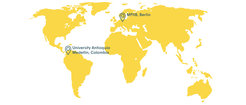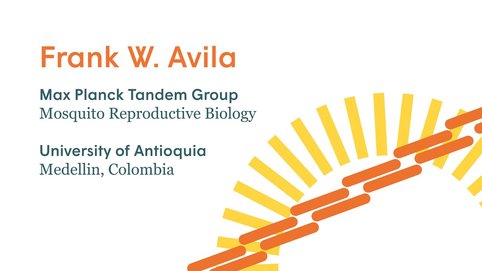'Quarantine without exception'
Interview on the current situation in Colombia with Frank Avila
COVID-19: Like everyone else, scientists are severely affected by the pandemic and the countermeasures. We have contacted our international cooperation partners to find out how the situation affects their work and how they are dealing with the crisis. This interview is the first part of a series of reports from the MPIIB tandem and partner groups.
Colombia has shut down public life and enforced a strict quarantine, Frank Avila's research is heavily affected by the current pandemic. On Wednesday, we contacted Frank via video call in Medellin to hear from his situation.
“About two weeks ago, the government started closing everything and restricting flights. This was the tip-off that we were going to be under enforced quarantine. So we started to wind things down in the lab and about a week and a half ago they imposed the strict quarantine. In practice, this means that we have to stay in our residences. Only a single person per household can go outside to shop for groceries for example. This is enforced by the police through a strict fine and potentially jail time.
This also means that we actually can't go into the lab: There's no exceptions for this. So when we realized that this is where we are heading, we ramped things down considerably. Now we are in a holding position.
But we are a still lucky: we work primarily on Aedes aegypti [yellow fever mosquito] and Aedes albopictus [tiger mosquito] and you can actually safe those eggs for some months. We have eggs for all the strains that we use stored in the lab. We’re okay for at least the next two or three months, after that it will get a little tricky because they will need to hatch. But we shouldn’t lose any of our strains. In that regard, we are super lucky – it’s not like Drosophila were you have to keep them alive continuously.
In theory, the quarantine is for two more weeks, but we don't know. In Colombia things change quite quickly. As of now, we're confined to our residences. They are using the final number in your ID-card and that gives you the day that you can go out. For me that’s Tuesdays and Fridays so that's the situation on the ground. We're strictly confined to our home: We are writing a few papers, we meet to have virtual journal club and I teach a class once a week online now. But that's it.
It would be nice if we could help by running tests for SARS-CoV-2. In the last couple of weeks, the government asked people do donate equipment and they are keeping taps on who is available to possibly run the tests. But to this time there has been not more than that.
I am hoping at one point we can at least go to the lab and start running the tests because even that would be better than being under quarantine.”

Frank Avila is head of the Max Planck Tandem Group at the University of Antioquia in Medellin, Colombia. He is a biologist and geneticist with extensive experience in reproductive biology of insect vectors. Frank’s research focusses on understanding sperm storage parameters in mosquitoes, analysing the proteins involved in fertility and reproduction processes. He is closely connected to the MPIIB Vector Biology Unit of Elena Levashina, takes part in retreats of the unit and can access their resources when needed.

